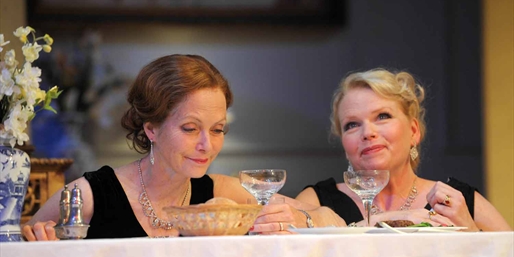“Fallen Angels”– an early showcase of Noël Coward’s “extraordinary gifts”

“The Times” reviewing the first production of “Fallen Angels” in April 1925 said of its author, Noël Coward, that he is “…the most uncannily adroit of our younger dramatists.” And young Noël certainly was - just 25 years of age in the year which saw the triumph of “The Vortex” as well as of “Fallen Angels”. Both of these plays are not just by a young playwright but are, as we shall see, also about young people. The plays created more than just a rush for tickets, though they did that, as they were highly controversial in their subjects – drug dependency in “The Vortex” and pre-marital sex and infidelity in “Fallen Angels”. The Times review of the latter is almost entirely complimentary but others were not so kind “degenerate”, “obscene” and “shocking” were some of the epithets used. But even where there was criticism of the subject of the play there was also praise – the “Sunday Times” said that Noel had “extraordinary gifts” and The Times complimented his “brilliant dialogue” and said that “…his wit never seems to fail him, even in the presentation, which might, clumsily handled have been so offensive, of two ladies who have drunk too much champagne”!
The whole of Act Two is given over to Jane and Julia who together battle with their consciences, and with each other, about how to handle the imminent arrival of the handsome Frenchman Maurice with whom they had both had an affair in the past. That was seven years ago, before they were married, and they have both been faithful to their husbands since. Their five-year marriages, whilst placid and rather complacent, are , it seems, not very exciting. Julia makes this clear to Fred when she says “We’re not in love a bit now, you know” Fred is a bit offended but agrees that “The first violent passion is naturally over” and that they have “…reached a remarkable sublime plane of affection and good comradeship…” For the two women this is perhaps not enough and that gives the arrival of Maurice so much excitement.
This was all rather daring for an audience in the mid 1920s . The convention was that whilst men played the field before marriage nice girls didn't. There is one deliciously funny exchange which addresses this hypocrisy:
Julia: It isn't as if we’d been unfaithful since marriage, it all happened before.This is stunningly witty writing and like so much in Coward’s work seems light, but has an inner depth. In The Times review from 1925 this is described as “…the art of suggesting à demi-mot, what might prove embarrassing if said outright.”
Jane: Yes, but men never forgive that sort of thing, whenever it happened.
Julia: It seems so unfair that men should have the monopoly of Wild Oats.
Jane: They haven't really, but it’s our job to make them think they have.
The latest revival of “Fallen Angels” is a touring production produced by Bill Kenwright, directed by Roy Marsden and starring Jenny Seagrove (Julia) and Sara Crowe (Jane) in the two leading roles. I saw it at the Rose in Kingston – the second of its nine venues. It is a pacey, well acted production with a strong cast and a good house at the Rose enjoyed it enormously. The success or failure of a production of this play must revolve around the casting and performances of the two lead roles – especially in the second Act where only they are on the stage (apart from the maid who keeps them vittled). Now I am going to be a tad ungallant here not to be unkind but because I think it shifts emphasis of the play to have two middle-aged actresses in the key roles. Miss Crowe is 47 and Miss Seagrove 56. They are well-preserved and attractive mature women, but “Fallen Angels” is not really a vehicle for women of a certain age. In 1949 the two Hermiones, Gingold and Baddeley, were similarly middle-aged in a London revival in which Noël Coward thought their performances “vulgar, silly, unfunny and disgraceful”.
The 1925 first production of “Fallen Angels” starred Tallulah Bankhead, who was 23 and Edna Best, who was 25. If we assume that Noël meant these two parts to be women in their mid twenties the story becomes rather different than if they are twenty or even thirty years older. The affairs with Maurice become teenage flings before marriage at around 20. Five years into marriage they are still very young and to reunite their passions with Maurice would be a very different matter than if they were aging ladies enjoying a nostalgic last fling. Indeed the story just doesn't work if the ladies are middle-aged. If they are fifty and have been married for five years what on earth were they doing between the ages of 20 and 45!
The theatre today, especially touring theatre, is obsessed with star names and audiences are drawn to seeing “someone off the telly”. Jenny Seagrove and to a lesser extent Sara Crowe are well known and will no doubt have drawn the punters in. But good though they were I do not think their casting was appropriate to Noël Coward’s original concept for the play. At about the same time that he was writing “Fallen Angels” he was also working on “Hay Fever” which does have a part for a woman of more mature years – Judith Bliss who is probably just the right side of 50. Noël did not intend June and Julia to be the same otherwise he would have structured the plot very differently and cast different actresses initially in the role. I hope that a future revival gives a chance to two of our young actresses and that it is not just a vehicle for those with some name appeal.

0 Comments:
Post a Comment
<< Home